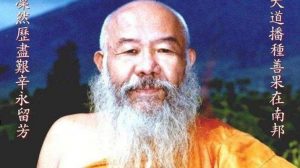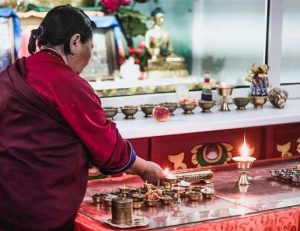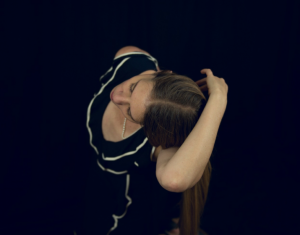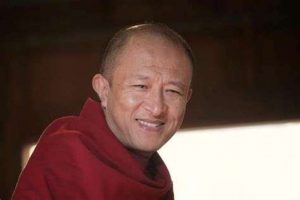
This article forms part of the “Buddhist Voices from the Land of Rivers” series, which is based on visits by the authors to Buddhist sites in Bangladesh and their meetings with leaders and activists from the Buddhist community.
There is an ongoing controversy within the Theravada tradition over the validity of bhikkhuni or female ordination. However, with strong support from some senior and influential monks within the sangha, the bhikkhuni order is now undergoing a revival. One such advocate is Venerable Ajahn Brahm, who participated in the ordination of four nuns in Perth in October 2009. In June this year, at the 14th Sakyadhita International Conference in Indonesia, Ajahn Brahm took the opportunity to remind bhikkhunis from all traditions of the Buddha’s last advice to monks—that the Dhamma and the Vinaya should be the teachers after him. Therefore, he said, if bhikkhuni ordination is performed in accordance with the Vinaya, bhikkhunis should not be overly concerned about the views of more conservative monks.
In May 2014, we interviewed Bangladesh’s first ordained female novice, Samaneri Gautami, at her temporary residence in Chittagong, which is also used as a nunnery, and talked extensively about the hurdles on her journey to ordination and beyond.
Samaneri Gautami, born Runa Barua, attributes her ordination to a variety of factors. As a child, she was very conscious of the presence of monks and felt a deep respect for the sangha. Under the influence of her grandmother, Samaneri Gautami began meditating when she was in Grade 2–3. In 1991, her experiences as a sadu-ma (in Bangladesh, a lay person who observes the Eight Precepts and wears white robes) and a meditation teacher encouraged her to continue her spiritual journey.

Despite attending religious ceremonies and teaching at retreats, Samaneri Gautami says she was regularly told that women could not be ordained, and it became clear to her that the female lay Buddhist community in Bangladesh was unaware of female ordination as it simply didn’t happen there.
“I also heard one reason given for the discontinuance of the bhikkhuni order was the belief that female ordination would shorten the life span of the sangha,” she says. “After an extensive investigation of many texts I realized this was not true. I found that Vinaya rules are the protector of the Buddhasasana [Buddhist Order].” Careful study of the Therigatha, a collection of poems written by arhat nuns during the Buddha’s time, only strengthened her eagerness to become a bhikkhuni.
As a young child, Samaneri Gautami was aware of the existence of Theravada nuns in Sri Lanka and Thailand, but knew there were none in Myanmar and Bangladesh, so she began to look outside of Bangladesh for a solution. In 2004, while attending a meditation retreat in Bodh Gaya guided by Venerable Dr. Rasthrapal, a senior monk from Bangladesh residing in India, she learned that he had ordained a female devotee from India. Samaneri Gautami had further discussions with Venerable Rashtrapal on two further visits to Bodh Gaya in 2006 and 2008. Although she had hoped that Ven. Rashtrapal would ordain her himself, he passed away after she returned to Bangladesh. In 2010, Samaneri Gautami visited Thailand, where she received encouragement from female activists and observed the development of women’s issues in the community.
Attending ceremonies and retreats back in Bangladesh, Samaneri Gautami couldn’t help but notice the lower status women were accorded at these occasions, driving her to seek ways to achieve greater equality. “I want to spread light among the Buddhist women,” she says. “I took a vow to fulfill this commitment and that I may have a religious life.”

Knowing the many problems facing women while guiding meditation retreats, she determined: “If women have a special place for meditation retreats [free from physical and mental harassment], a place to practice the Dhamma or to live celibate lives [anagarika], our women won’t be misguided.”
Samaneri Gautami readily acknowledges the desperate lack of opportunities in Bangladeshi society for female laity to pursue spiritual development. Two girls now residing with Samaneri Gautami, one ethnic Chakma and the other Barua, for example, had decided to live celibate lives, either as samaneri (a female novice) or sadu-ma. However, they lacked a place to live and practice a religious life. “If there were such a place, our women would have a chance to practice the Dhamma and know more about the reality of life,” says Samaneri Gautami.
Asked whether it would be more appropriate for bhikkhus or bhikkhunis to lead retreats discussing women’s problems, Samaneri Gautami replies: “Women are reluctant to share many problems with bhikkhus. As a result, women feel isolated. By seeing me as a nun, our women can also be encouraged. Once, when I showed them a foreign calendar with pictures of bhikkhunis, they were surprised as they had never seen women in robes. Now they realized they too could be ordained.”
Samaneri Gautami notes that in Bangladeshi culture women, unlike men, cannot easily remarry when their spouses pass away—if a man decides that he doesn’t want to remarry he can choose to become a monk, but women do not have the same option, which causes a lot of suffering for devout women. “If we can do away with such negative causes, our women can develop further. Ultimately, it is the society which will profit by allowing women to play important developmental roles.”

When teaching at retreats or attending religious ceremonies, Samaneri Gautami raised the issue with many senior monks. Although they insisted that conservative monks in the historical Buddhist councils had prohibited female ordination, they provided no evidence to support their assertions.
Seeking another avenue, Samaneri Gautami contacted Venerable Dr. Bharasambodhi, a Bangladeshi monk living in India, whom she knew from her Dhamma and meditation teaching. She explained her wish to become a nun in Bodh Gaya. “He told me there was no problem, I can just go to Bodh Gaya immediately and be ordained. His own eagerness to re-establish the bhikkhuni order strengthened my faith about my chosen path.” Samaneri Gautami also discussed her plan with the women assisting her in teaching meditation. Although initially skeptical as the proposal was beyond their experience, some of them also went on to take novice ordination.
“I also asked my mother several times to allow me to become a nun just like [in the story of] Emperor Asoka, who donated his daughter Sanghamitta to the bhikkhuni order,” she says. “Of course, the initial response from family members was not all positive because our local Buddhist society does not have the environment needed for female ordination. My mother told me to wait until she passes away, but I explained that it would be worth more merit for her if she offered her daughter to the Buddhasasana while alive.”
Samaneri Gautami’s mother finally gave her consent in 2011 and even intimated an interest in taking temporary ordination along with her daughter. “I was personally gratified by this because [her decision gave me] a way to demonstrate my gratitude to her.”
John Cannon is the former content editor and Jnan Nanda, currently a PhD candidate at the University of Hong Kong, is the former news and media analyst of Buddhistdoor Global.
See more
“Buddhist Voices from the Land of Rivers”: Let Hope Rise from the Ashes (Buddhistdoor Global)
“Buddhist Voices from the Land of Rivers”: Looking from the Inside Out (Buddhistdoor Global)
“Buddhist Voices from the Land of Rivers”: Moanoghar, Beacon of Hope (Buddhistdoor Global)
“Buddhist Voices from the Land of Rivers”: In Conversation with Venerable Buddhadatta (Buddhistdoor Global)
“Buddhist Voices from the Land of Rivers”: Villagers Observing “Uposatha” in Rangamati (Buddhistdoor Global)











